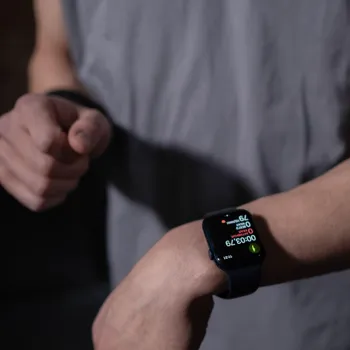Embark on a journey to a healthier you by setting realistic fitness goals. Discover how in this comprehensive guide
In today's fast-paced world, everyone's talking about fitness. But, let's be honest, starting
isn't always easy. Setting achievable fitness goals can feel like climbing Mount Everest without proper gear.
Many folks start strong, fueled by New Year's resolutions or a sudden urge for a healthier lifestyle, only to fizzle out within weeks. This often happens because the goals set are too ambitious, unrealistic, and frankly, a recipe for disappointment.
So, how do you break free from this cycle and actually achieve your fitness dreams? This comprehensive guide will help you set realistic goals, stay motivated, and transform your well-being in a sustainable way.
Assess fitness level, determine "why" for motivation, start journey
Before you even think about dumbbells or treadmills, take a long, hard look at yourself. What's your current fitness level? Be brutally honest. Can you walk a kilometer without getting winded? Have you ever lifted weights before?
Don't compare yourself to fitness influencers or your super-fit neighbor. Everyone starts somewhere, and it's crucial to assess your starting point accurately. Consider any pre-existing health conditions or injuries. If you have knee problems, running a marathon might not be the best initial goal.
If you're unsure, consult a doctor or a physiotherapist. They can provide personalized advice based on your specific health profile. Once you have a clear understanding of your physical condition, it's time to figure out your "why." Why do you want to get fit?
Is it to lose weight, gain muscle, improve your energy levels, or reduce stress? Your "why" will be your guiding light when motivation wanes. Write it down and keep it somewhere you'll see it regularly.
Knowing your "why" will help you stay committed and focused, especially when faced with challenges or temptations. This self-awareness is the bedrock upon which you'll build your fitness journey.
Get SMART: Specific, Measurable, Achievable, Relevant, Time-bound goal setting
Now that you know yourself and your "why," it's time to get SMART. SMART is an acronym that stands for Specific, Measurable, Achievable, Relevant, and Time-bound. Let's break down each component: Specific means clearly defining what you want to achieve.
Instead of saying "I want to get fit," say "I want to be able to run a 5k." Measurable means setting quantifiable targets that you can track. Instead of saying "I want to lose weight," say "I want to lose 2 kgs in a month." Achievable means setting goals that are realistic and within your reach.
Don't aim to lose 10 kgs in a week; that's not safe or sustainable. Relevant means aligning your goals with your overall values and priorities. If you hate running, don't force yourself to train for a marathon. Choose activities you enjoy.
Time-bound means setting a specific deadline for achieving your goals. This creates a sense of urgency and keeps you accountable. For example, "I want to be able to do 20 push-ups by the end of three months.
" By using the SMART approach, you transform vague aspirations into concrete, actionable plans.
Break big goals into manageable steps for long-term success
Rome wasn't built in a day, and neither is a fit body. The key to long-term success is breaking down your big goals into smaller, more manageable steps. Think of it like climbing a staircase instead of trying to scale a wall.
For example, if your goal is to run a 5k, start by walking for 30 minutes three times a week. Gradually increase the duration and intensity of your walks until you can comfortably jog for a few minutes at a time.
Then, slowly increase the jogging intervals and decrease the walking intervals until you can run the entire distance. Celebrate your small victories along the way. Each step you take, no matter how small, is a step closer to your goal.
Acknowledge your progress and reward yourself (with something healthy, of course!). This positive reinforcement will keep you motivated and engaged. Remember, consistency is more important than intensity. Aim for regular, moderate exercise rather than sporadic bursts of intense workouts.
This approach is more sustainable and less likely to lead to burnout or injury.
Find enjoyable exercises for long-term fitness success
Exercise shouldn't feel like a chore. If you dread your workouts, you're less likely to stick with them. The secret to long-term fitness is finding activities you genuinely enjoy. Experiment with different forms of exercise until you find something that clicks.
Maybe you love dancing, swimming, cycling, or hiking. Perhaps you prefer team sports like badminton or basketball. The possibilities are endless! Don't be afraid to try new things. You might discover a hidden talent or passion. Consider joining a fitness class or a sports team.
This can provide structure, social support, and a sense of community. Working out with others can make exercise more fun and engaging. Listen to your body. If you're feeling pain, stop and rest. Don't push yourself too hard, especially when you're just starting out.
Remember, fitness is a journey, not a race. The goal is to find sustainable habits that you can maintain for the long haul.
Monitoring progress with fitness journal or tracker app boosts motivation and success
Monitoring your progress is essential for staying motivated and on track. Keep a fitness journal or use a fitness tracker app to record your workouts, meals, and other relevant data.

This will help you see how far you've come, identify areas where you're struggling, and make adjustments to your plan as needed. Track your weight, body measurements, and exercise performance.
For example, record how many push-ups you can do, how fast you can run a kilometer, or how much weight you can lift. Regularly review your progress and celebrate your achievements. Visualizing your success can be a powerful motivator.
Share your goals and progress with a friend, family member, or personal trainer. Having someone to hold you accountable can make a big difference. They can offer encouragement, support, and constructive feedback. Don't be afraid to ask for help.
A personal trainer can create a customized workout plan, provide guidance on proper form, and help you stay motivated.
Stay positive, adjust goals, focus on progress in fitness journey
Life happens. Sometimes, you'll miss workouts due to illness, travel, or other commitments. Don't get discouraged. Just get back on track as soon as possible. Be flexible and willing to adjust your goals as needed.
If you're consistently struggling to meet a particular goal, it might be too ambitious. It's okay to scale back your expectations and set more realistic targets. Remember, the goal is progress, not perfection. Don't compare yourself to others. Everyone's fitness journey is unique.
Focus on your own progress and celebrate your own achievements. Stay positive and believe in yourself. You are capable of achieving your fitness goals. By following this comprehensive guide, you can set realistic goals, stay motivated, and transform your well-being in a sustainable way.
So, take the first step today and embark on your journey to a healthier, happier you.
factual content aligns with prompt's requirement
Your first sentence indicates an understanding of the current context. The information provided is all factual and is in line with the prompt's requirement.













